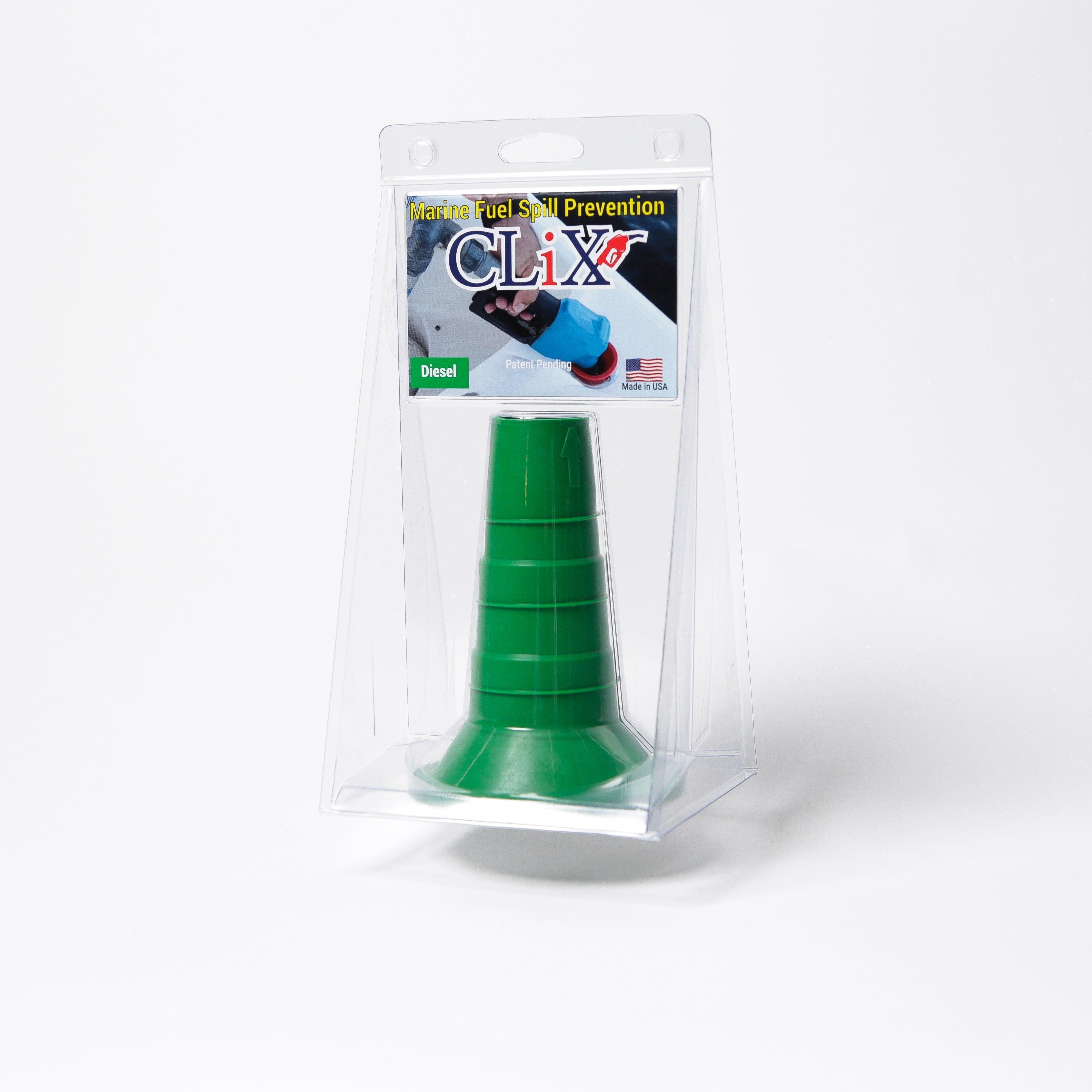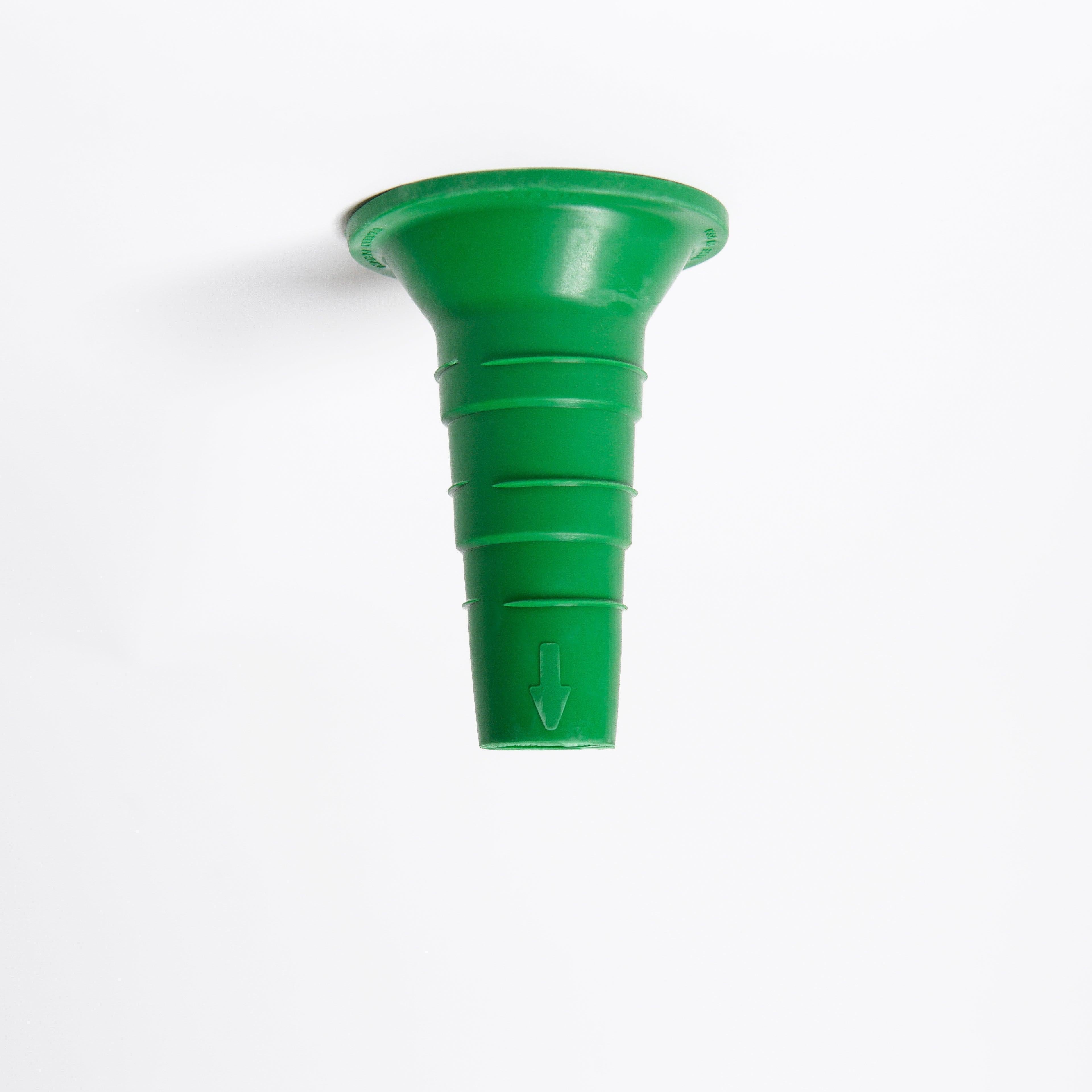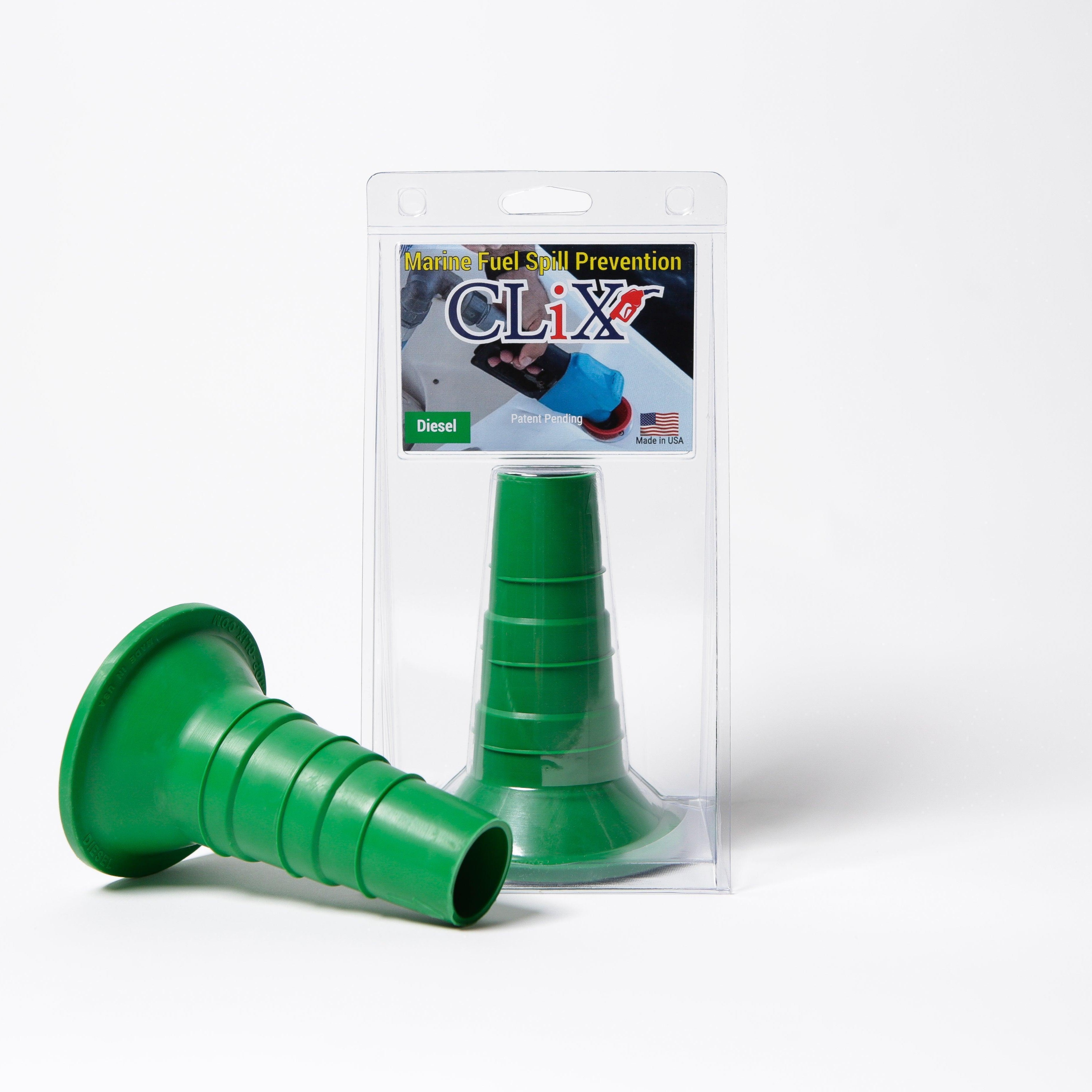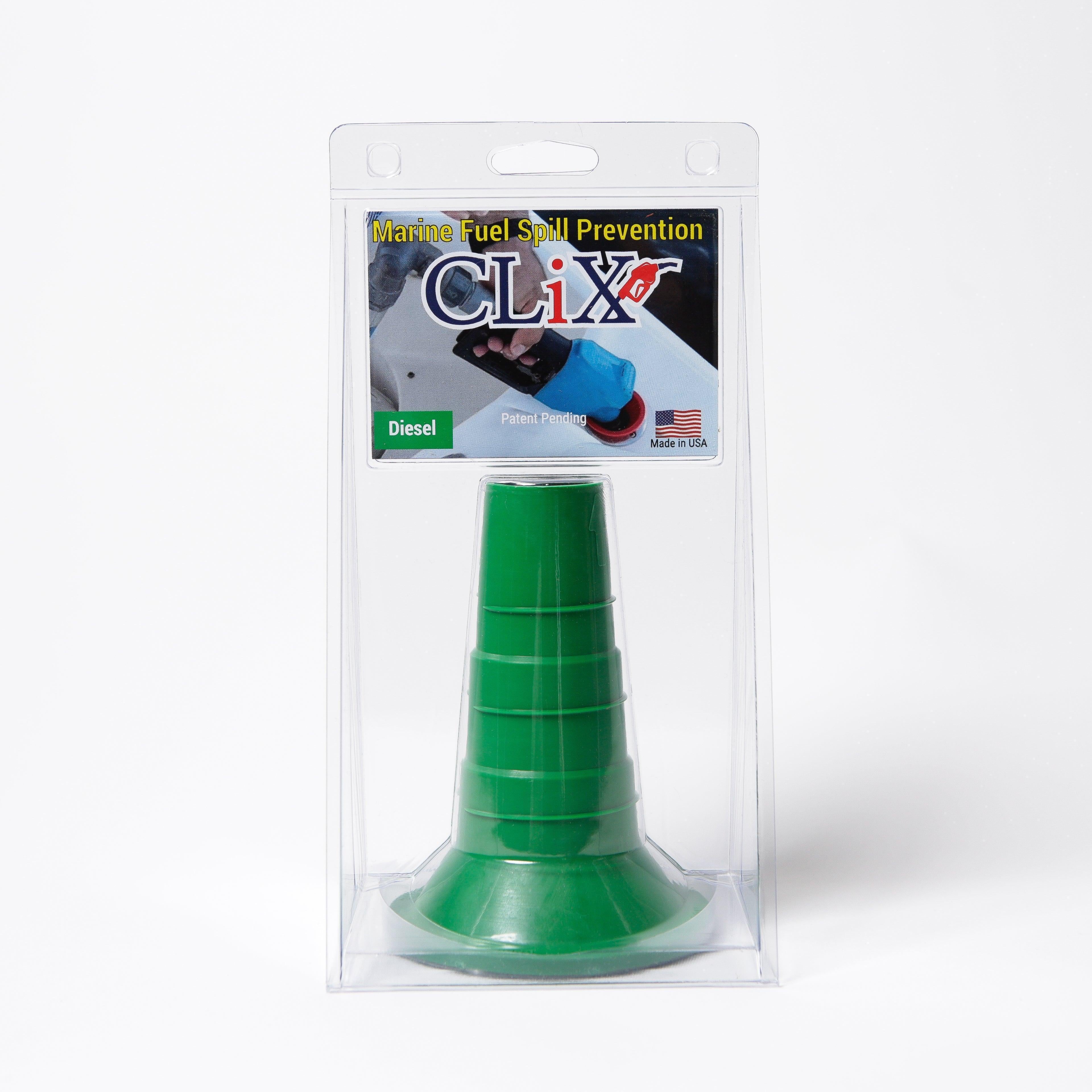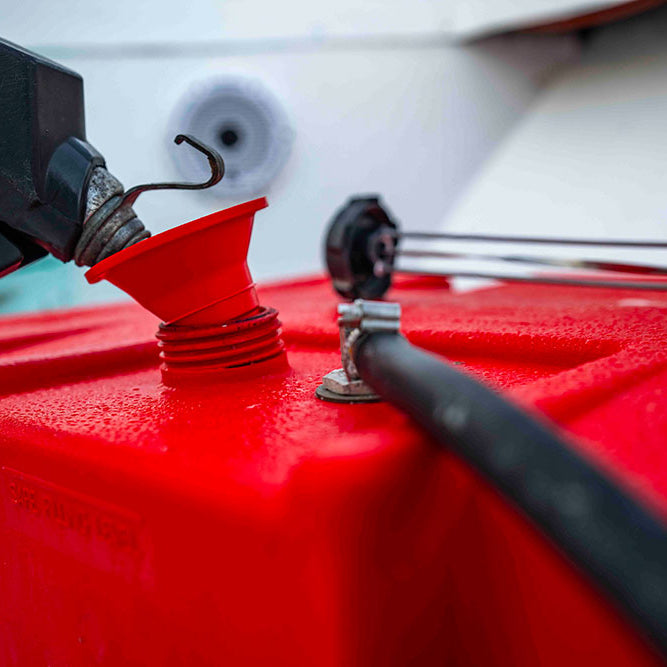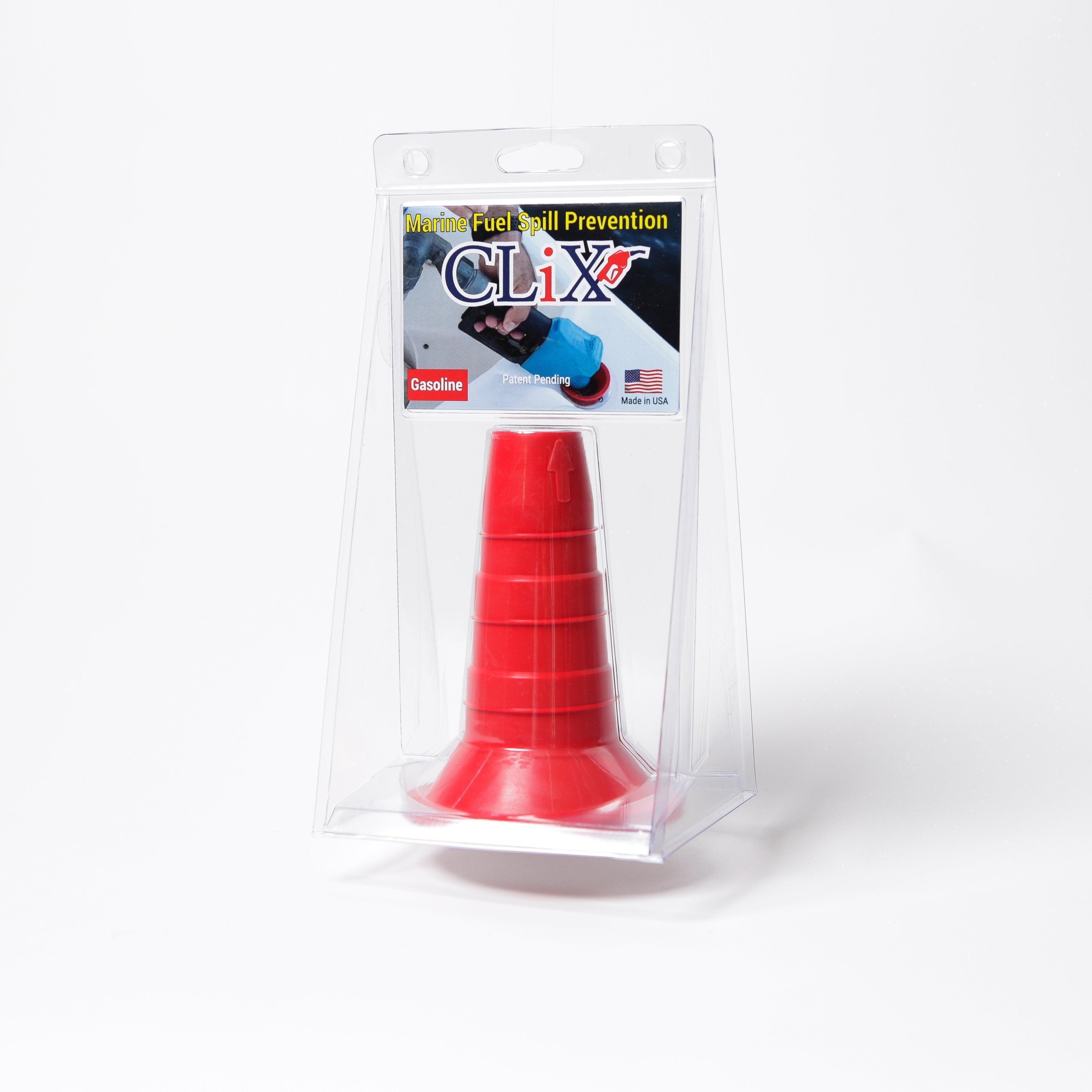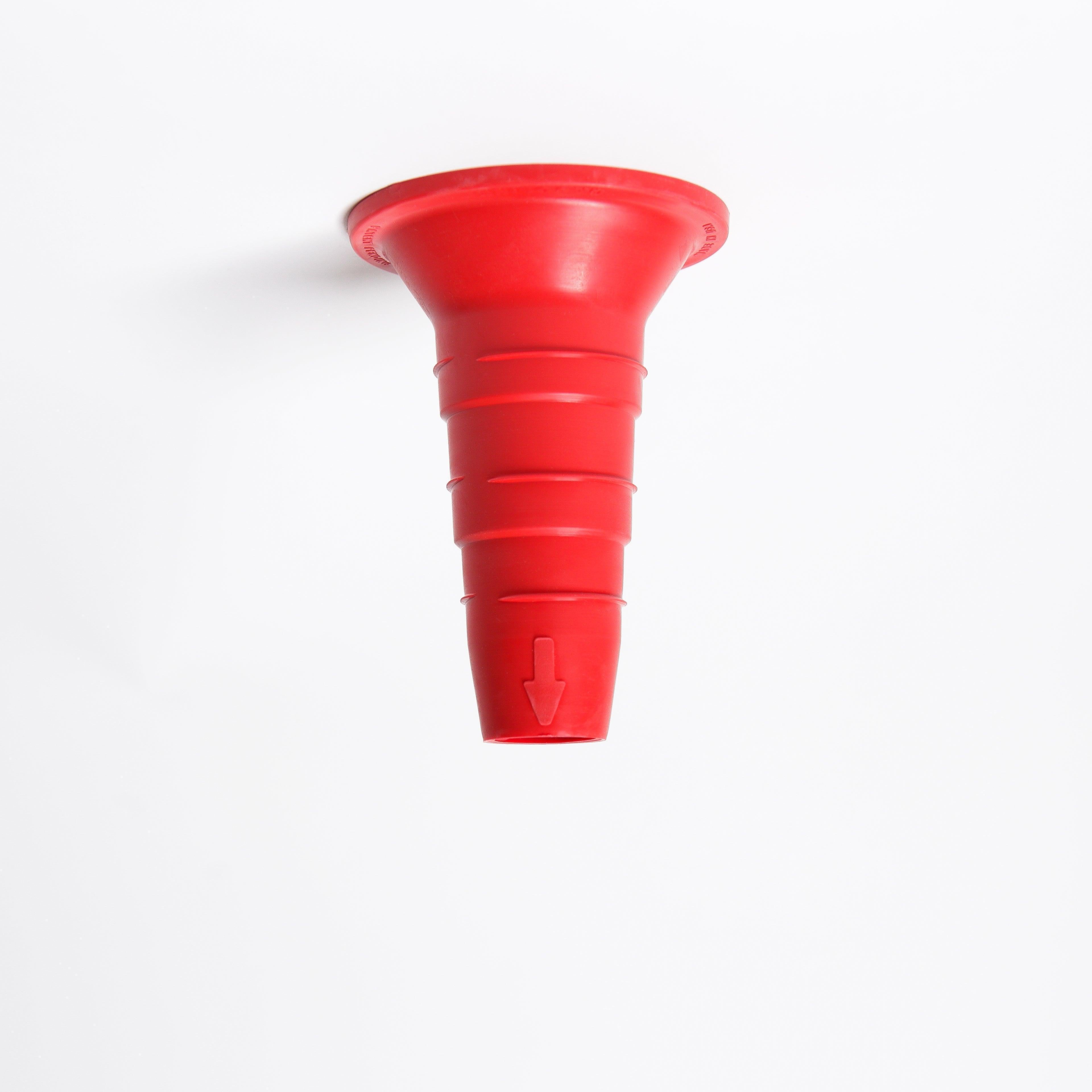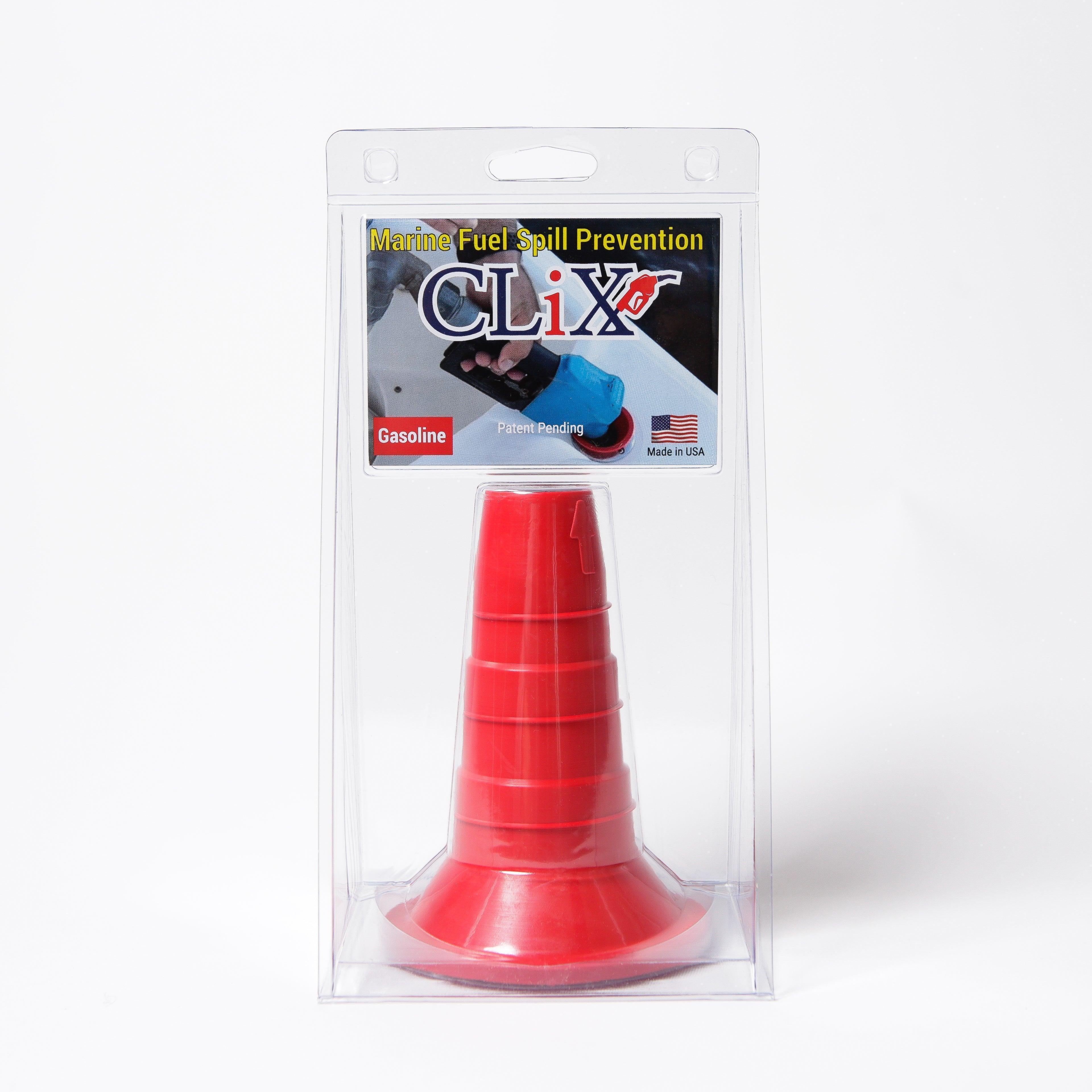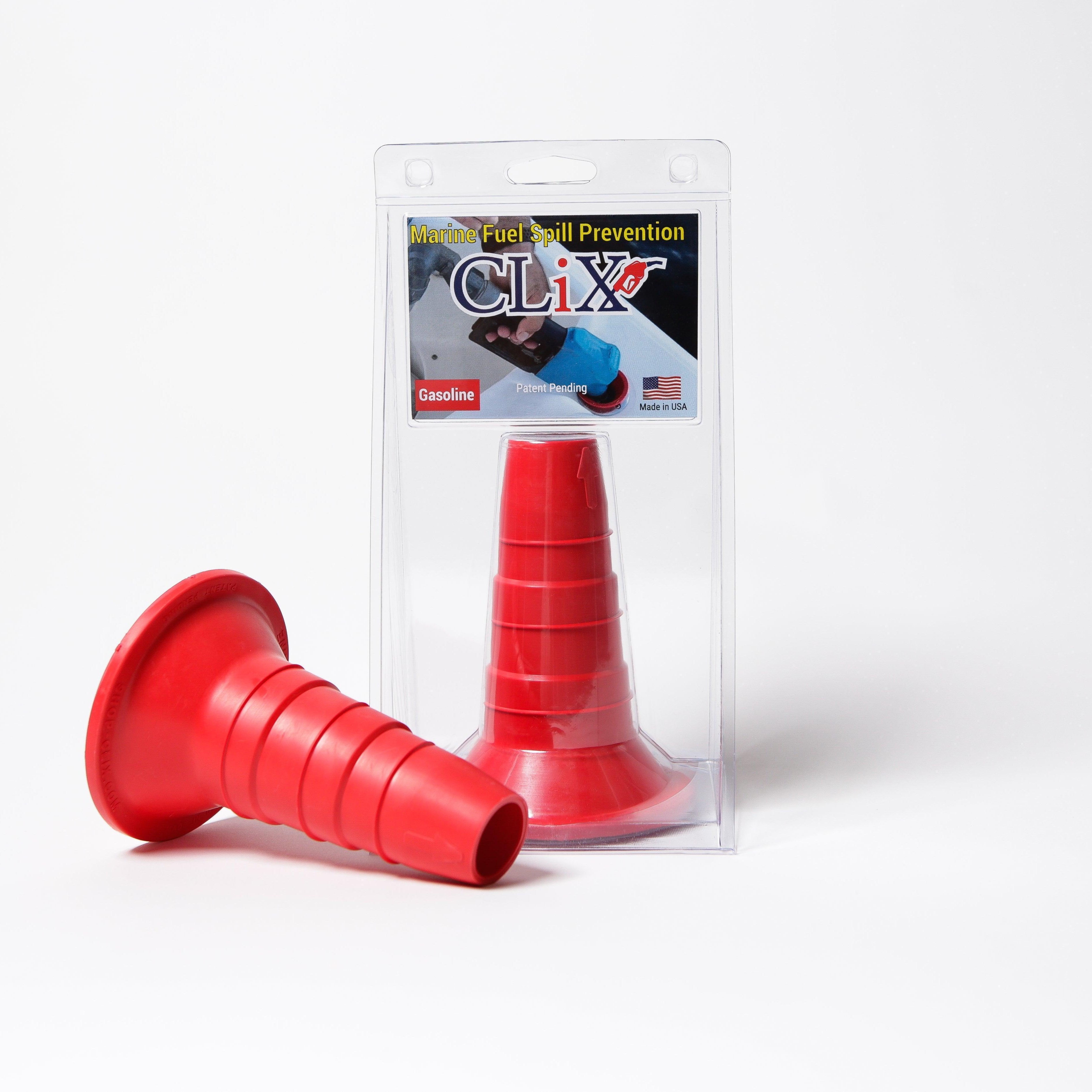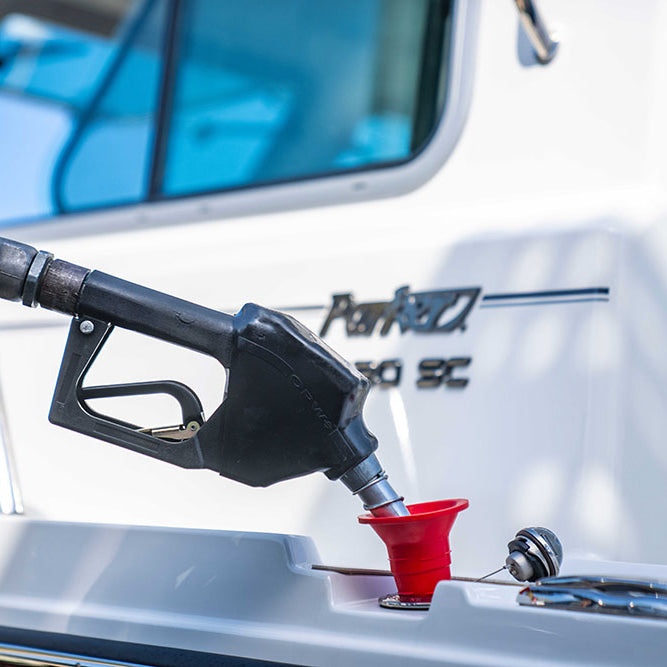Grabbing any old funnel to top off your diesel tank might seem harmless, but it's a gamble you don't want to take. A funnel specifically designed for diesel isn't just a piece of plastic; it's the first line of defense for your engine's highly sensitive fuel system. It’s designed to stop microscopic troublemakers that a generic funnel would let slide right through.
Why a Standard Funnel Is a Risk to Your Diesel Engine
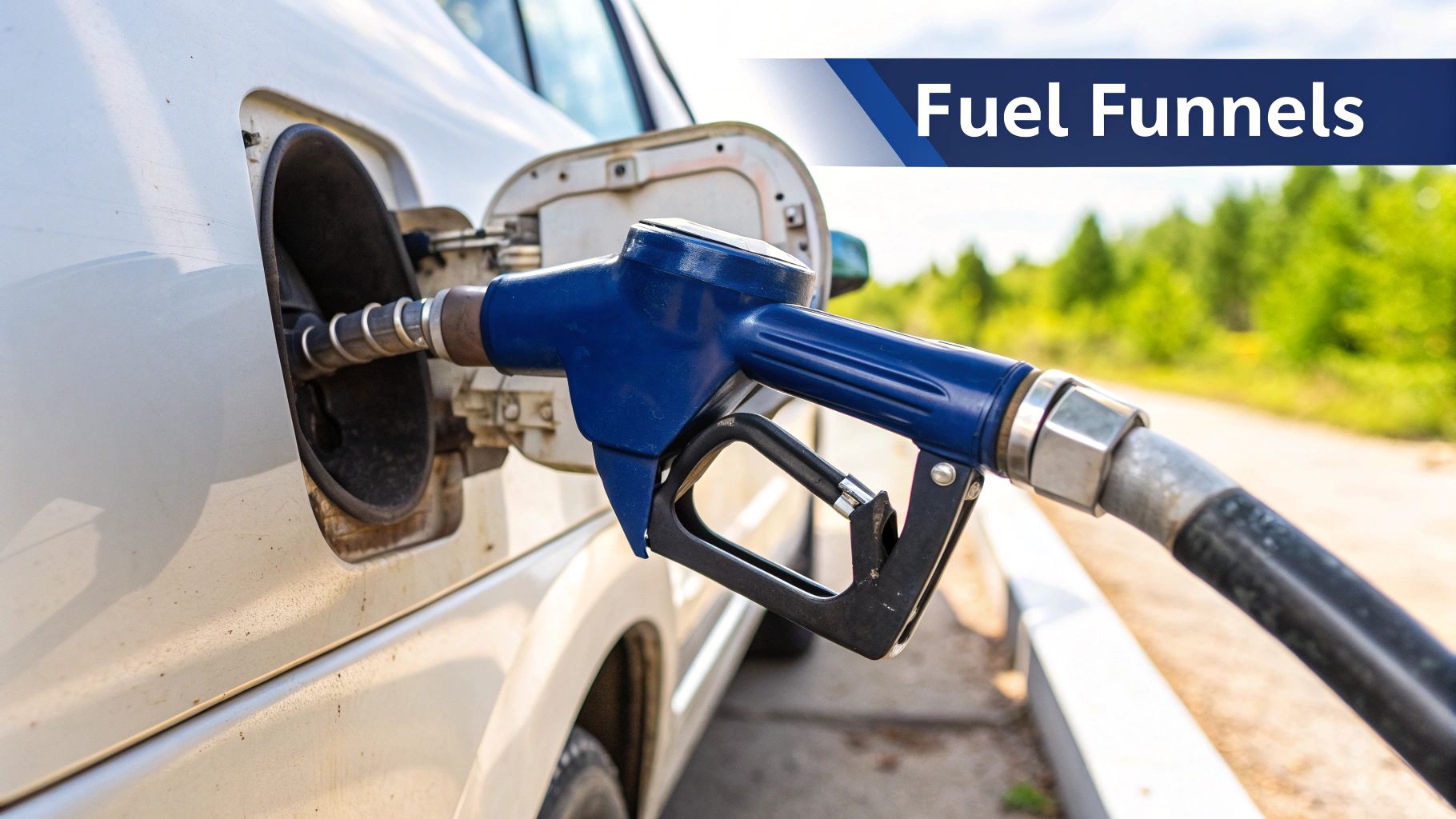
Picture yourself refueling on a dusty job site or a damp marina. It’s easy to just grab whatever funnel is lying around. But that simple act can introduce a flood of tiny dirt particles, debris, and even water into your fuel tank. A gasoline engine might shrug it off, but for a modern diesel engine, it's a serious threat.
The High-Stakes World of Diesel Engines
Today's diesel engines are marvels of engineering, operating under immense pressure with parts built to microscopic tolerances. Think of your fuel injectors—they're precision instruments that can be wrecked by contaminants you can't even see. Using a basic funnel is like making a gourmet coffee with unfiltered swamp water. It might work for a bit, but eventually, that finely-tuned system will clog, corrode, and fail.
A standard funnel simply can't protect you from two of diesel's biggest enemies:
- Particulates: Tiny bits of dust, rust, and grit act like liquid sandpaper grinding away at your fuel pump and injectors.
- Water: Even a small amount of water from condensation or bad fuel can lead to corrosion and encourage microbial growth, often called the "diesel bug."
A standard funnel just guides liquid from one place to another. A specialized diesel fuel funnel protects a high-performance engine by cleaning that liquid as it enters the tank.
At the end of the day, it's all about proactive maintenance. Protecting your investment starts long before you turn the key—it starts at the fuel can. A proper fuel funnel for diesel is a simple step that ensures only clean fuel gets into your tank, which goes a long way toward keeping your engine healthy and avoiding massive repair bills.
The Hidden Dangers Lurking in Your Diesel Fuel
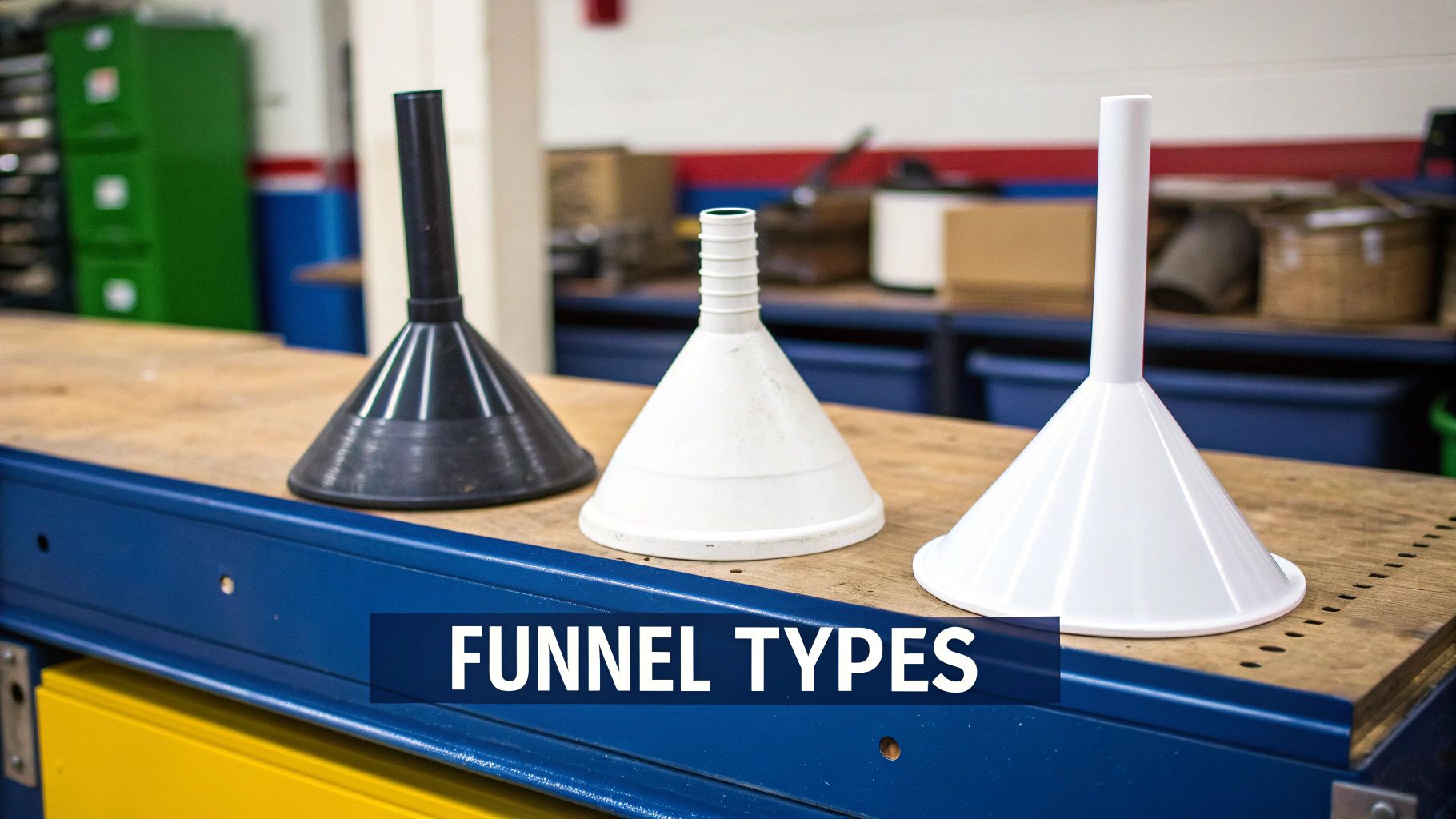
It’s easy to think of fuel contamination as just a little bit of dirt in the tank. But that couldn't be further from the truth. Think of your diesel fuel system like your engine's bloodstream—and contaminants are the infection, quietly spreading and attacking critical parts like fuel injectors and high-pressure pumps.
What starts as a seemingly small problem can quickly spiral into poor performance, lousy fuel economy, and repair bills that run into the thousands. With the global diesel market hitting around USD 241.41 billion and commercial vehicles accounting for over 61% of that, protecting these expensive assets is just smart business. Our reliance on diesel makes clean fuel an absolute must. You can learn more about these global diesel fuel market trends.
These unseen threats are almost always the root cause of serious engine problems.
The Three Main Contaminants
To protect your engine, you first have to know what you're up against. Three types of contaminants are especially nasty for diesel systems.
-
Water Contamination: This is the most frequent and destructive culprit. Water sneaks in through condensation or during refueling, causing rust. Even worse, it creates the ideal environment for microbial growth—the infamous "diesel bug"—which forms a thick sludge that clogs up the entire system.
-
Particulate Matter: Imagine tiny bits of dirt, sand, rust, and metal shavings flowing through your fuel lines. This stuff acts like liquid sandpaper, grinding away at the delicate, precision-made surfaces inside your fuel pump and injectors. Over time, the damage is permanent.
-
Chemical Degradation: When diesel fuel is exposed to heat and oxygen, it can oxidize, forming gums and varnishes. These sticky deposits can make injectors stick, messing up the fine spray pattern your engine needs for clean, efficient combustion.
Contaminated fuel doesn't just hurt performance; it actively destroys your engine from the inside out. The only way to ensure your equipment stays reliable and lasts is to be proactive about prevention.
The good news is that you can stop each of these contaminants before they ever get into your tank. Using a specialized fuel funnel for diesel is your most effective first line of defense. Knowing how different fuel funnel filters work is key to choosing the right protection for your gear.
Choosing the Right Diesel Fuel Funnel
When you're dealing with a high-performance diesel engine, picking the right tool for the job isn't just a good idea—it's essential. A specialized fuel funnel for diesel is one of those non-negotiable tools. Let's be clear: not all funnels are the same. A cheap, generic plastic cone is a world away from a high-quality model designed to act as a sophisticated filtration system. The right one can stop contaminants dead in their tracks, preventing thousands of dollars in potential engine damage.
Think of it like buying safety gear for a dangerous job. You wouldn't settle for the cheapest option; you'd look for materials and designs that have been proven to perform under pressure. The goal here is simple: find a funnel that offers a complete defense against both the solid gunk you can see and the hidden water you can't.
The image below shows just how critical a clean, smooth pour is for maintaining engine efficiency and long-term health.
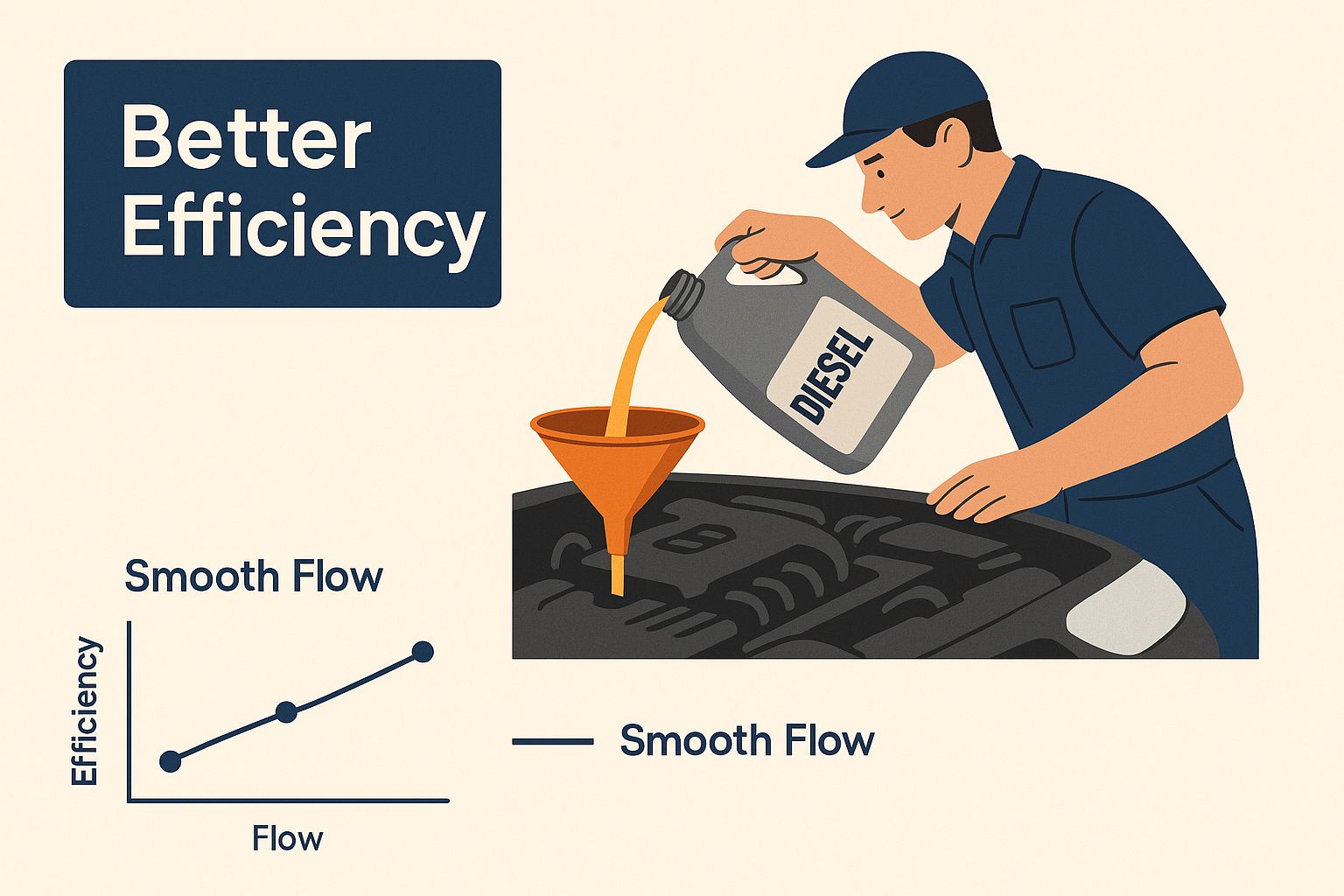
As you can see, ensuring clean fuel flow from the very start is the first step toward keeping your engine running strong for years to come.
Must-Have Funnel Features
To get real protection, you need to look for specific features. These aren't just bells and whistles; each one plays a vital role in keeping your diesel fuel supply as pure as possible.
-
Anti-Static Materials: As diesel fuel flows through a standard plastic funnel, it can generate static electricity. That's a huge risk when you're handling flammable liquids. A proper funnel is built from conductive, anti-static materials that safely ground this charge, eliminating the danger of a spark.
-
Fine-Mesh Filtration Screen: This is your engine's first line of defense against solid debris. Any high-quality funnel will have a built-in screen fine enough to catch the rust, dirt, and other nasty particles that can easily score injectors and clog up your fuel filters.
-
Water-Separating Technology: This is where the best funnels really shine. The most advanced fuel funnels for diesel feature a special coating that lets diesel pass right through while repelling water. The water beads up and collects in a sump at the bottom, which you can then drain off. It's the single most effective way to stop water contamination right at the source.
When choosing a funnel, it's helpful to see a direct comparison of what you get with a specialized tool versus a standard one.
Essential Features of High-Performance Diesel Funnels
| Feature | Standard Funnel | Specialized Diesel Funnel |
|---|---|---|
| Material | Basic Plastic | Conductive, Anti-Static Polymer |
| Filtration | None or Coarse Mesh | Fine-Mesh Stainless Steel Screen |
| Water Removal | None | Hydrophobic Coating & Water Sump |
| Safety | High Static Risk | Grounds Static to Prevent Sparks |
This table makes it clear that a specialized funnel isn't just a convenience—it's an investment in your engine's health and your own safety.
Design Elements That Matter
Beyond filtration, the physical design of the funnel makes a world of difference in how easy and effective it is to use. A poorly designed funnel can lead to spills and frustration, completely defeating its purpose. For those working with different kinds of machinery, like marine engines, understanding the specific design needs is also crucial. You can learn more about this in our guide on choosing a fuel funnel for a boat.
A funnel’s job isn’t just to guide fuel. It’s to prevent spills, filter contaminants, and ensure a clean, safe transfer every single time.
Keep an eye out for these practical design elements:
- Wide Mouth and Anti-Splash Lip: A wide opening makes it much easier to pour from heavy, awkward fuel cans. A raised lip around the edge is a simple but brilliant feature that keeps fuel from splashing out and making a mess.
- Long, Flexible Neck: Let's face it, fuel ports are often in the most inconvenient, hard-to-reach places. A flexible neck lets you securely position the funnel for a steady, spill-free flow, no matter the angle.
How a Better Funnel Protects Your Engine
Think of a high-quality diesel fuel funnel as cheap insurance for your engine. It’s not just a tool for avoiding spills; it’s one of the simplest and most effective ways to protect the thousands of dollars you have invested in your machinery.
Clean fuel is the lifeblood of a diesel engine. By making sure only pure fuel makes it into your tank, you’re actively preventing the kind of wear and tear that leads to catastrophic—and expensive—failures down the road.
Shielding Your Most Expensive Parts
The high-tech components in modern diesel engines are built to incredibly tight tolerances. They're marvels of engineering, but they're also extremely vulnerable to contaminants like dirt, grit, and water.
- Fuel Injectors: These precision parts can cost a small fortune to replace. Even tiny bits of debris can clog their nozzles, ruining the fuel spray pattern. This leads to lost power, poor fuel economy, and eventual engine damage.
- High-Pressure Fuel Pumps: Contaminants essentially turn your fuel into liquid sandpaper. Grit and grime scour the inside of these pumps, causing a drop in fuel pressure that hurts performance and ultimately leads to total failure.
Clean fuel isn't just a suggestion; it's a non-negotiable requirement for a healthy diesel engine. A good funnel acts as the first line of defense, keeping the bad stuff out.
Stopping contamination before it starts pays off in multiple ways. You’ll find yourself changing fuel filters less often, enjoying more reliable startups, and maintaining better fuel efficiency over the long haul.
People choose diesel engines for their durability and power. With modern systems like selective catalytic reduction (SCR) and diesel particulate filters (DPF), these engines are cleaner and more efficient than ever. You can learn more about how diesel engines continue to adapt to new standards.
Protecting that legendary longevity starts with one simple step: filtering your fuel every single time you fill up. In the end, a specialized funnel is a small investment that helps maintain peak performance and extend the working life of your engine.
Common Refueling Mistakes That Ruin Engines
Having the right tool is a great start, but how you use it is what really counts. Even with a top-notch fuel funnel for diesel, a few simple mistakes can send a stream of junk straight into your engine, defeating the whole purpose. These little oversights can lead to some seriously expensive problems down the road.
One of the most common blunders we see is bad storage. Just tossing your funnel onto a dusty workbench or leaving it to roll around in the back of your truck is asking for trouble. All that grit and grime collects inside, and the next time you refuel, you're just washing it all directly into your fuel tank.
Cross-Contamination and Weather Woes
Another huge mistake is using your diesel funnel for other fluids. Pouring oil, coolant, or—even worse—gasoline through it just once can leave behind a residue that will contaminate your diesel. That kind of chemical mix is a nightmare for a high-pressure fuel system.
The rule is simple: a dedicated fuel funnel for diesel should only ever touch diesel fuel. Keep it separate, keep it clean, and keep it covered.
And don't forget about Mother Nature. Refueling during a downpour or in the middle of a dust storm is a recipe for disaster if you aren't careful. Water and airborne debris can easily find their way into the fuel stream, sneaking right past your funnel's defenses.
To sidestep these common pitfalls, just build a few good habits:
- Store It Right: Always wipe the funnel clean with a lint-free cloth after using it. Then, pop it into a sealed plastic bag to keep it pristine.
- Dedicate Its Use: This one’s non-negotiable. Never use your diesel funnel for anything but diesel. A clear label can help prevent mix-ups.
- Watch the Weather: If you have to refuel in bad weather, do your best to shield the fuel can and funnel opening from the elements.
These practices are crucial. Diesel engines give you an efficiency of about 40%, which is why they're the workhorses for tough jobs. This reliance on diesel power is exactly why specialized accessories are needed to protect these valuable machines. You can find more details in this comprehensive diesel fuel market report. By avoiding these simple mistakes, you're making sure your gear, including tools like a diesel fuel nozzle adapter, can do its job without a hitch.
Got Questions About Diesel Funnels? We’ve Got Answers.
We’ve talked a lot about why the right equipment is so important for keeping your engine healthy. But let's be honest, you probably still have some practical questions. To help you feel completely confident, we've rounded up the answers to the questions we hear all the time about fuel funnels for diesel.
Think of this as your go-to guide for those real-world situations you run into on the job or at the dock. Getting these details right is how you protect your investment for the long haul.
Can I Use a Regular Gas Funnel for Diesel?
We get this one a lot, and the answer is a hard no. It might seem like they do the same job, but it’s a bad idea for a couple of big reasons.
First, gasoline funnels lack the super-fine filtration needed to catch the tiny bits of debris and water that modern diesel injectors just can't handle. They simply weren't built with that level of protection in mind.
On top of that, the plastic in many gas funnels isn't designed to hold up against diesel fuel. Over time, the diesel can actually break down the plastic, releasing small particles right into your fuel tank. Your best bet is to always use a funnel made specifically for diesel.
Using the wrong funnel is like using the wrong oil—it might seem to work at first, but it causes serious, hidden damage over time.
What’s the Right Way to Clean and Store My Diesel Funnel?
Taking good care of your funnel is just as important as using it. After you’re done refueling, just wipe it down with a clean, lint-free cloth. And here’s a crucial tip: Never wash it with water. Water is the number one enemy of a diesel fuel system, and you don’t want to introduce any moisture.
When you’re ready to put it away, store it in a sealed plastic bag or a clean, dedicated container. This simple step keeps dust and dirt out, so you aren't pouring contaminants into your tank the next time you refuel. A clean funnel means clean fuel.
What’s a Water-Separating Funnel?
A water-separating funnel is a major leap forward from a standard screen filter. While a basic mesh screen does a decent job of stopping solid stuff like dirt and rust, it’s completely useless against water.
This is where a water-separating funnel shines. It uses a special, hydrophobically coated screen that lets diesel pass right through while physically blocking water molecules. The water that gets separated collects in a small sump at the bottom of the funnel, where you can easily drain it away. For today's sensitive diesel engines, this is the best protection you can get.
Ready to eliminate refueling spills and protect your engine with the best technology? CLiX Fueling Solutions offers a spill-free, automatic shut-off system that ensures a perfect fill every time. Discover the CLiX difference and safeguard your investment today.

